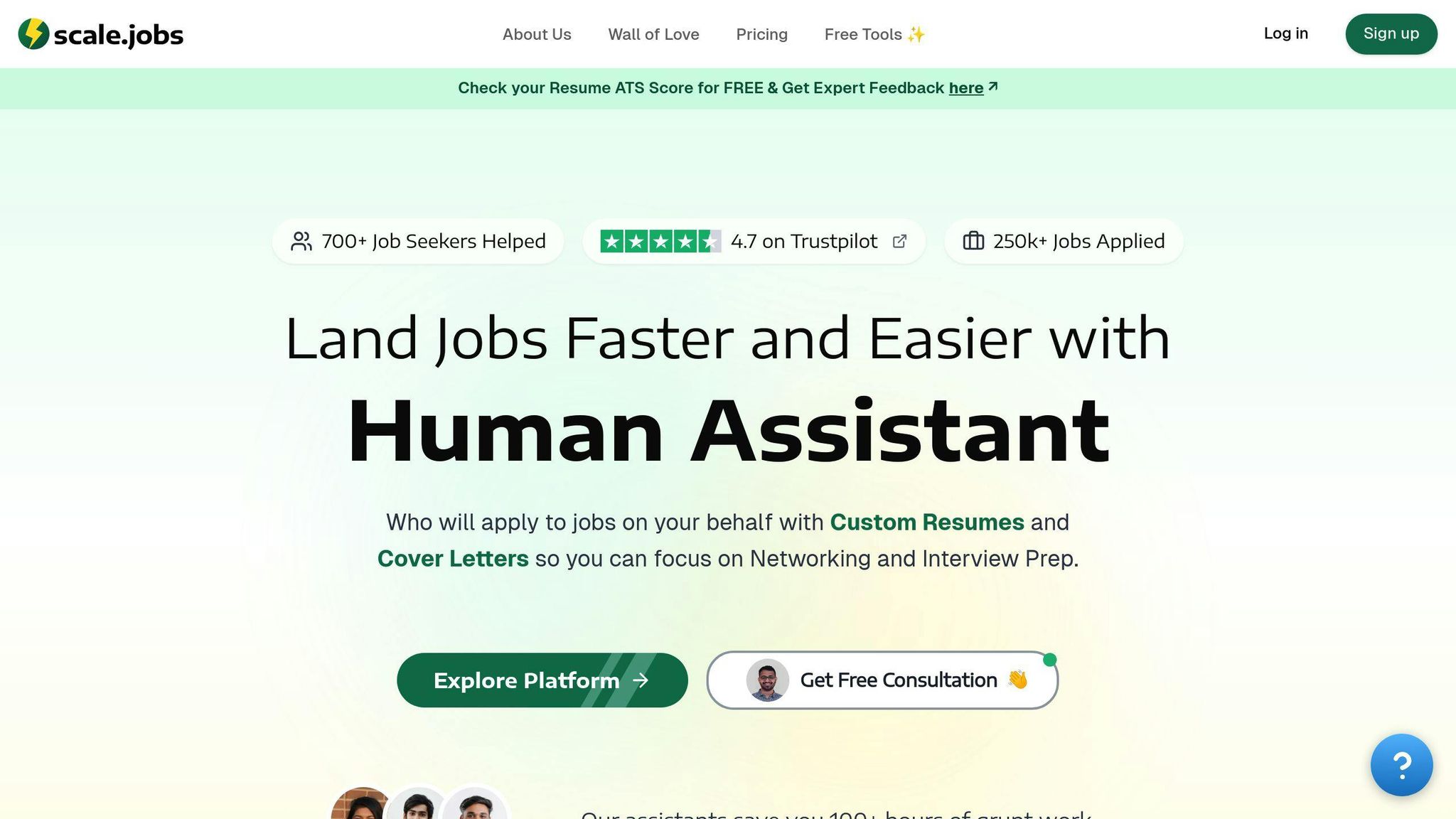Guide to Salary Negotiation for International Jobseekers
Master the art of salary negotiation as an international jobseeker by understanding local norms, visa rules, and total compensation packages.

Negotiating salaries abroad can be tricky. From understanding local pay norms to navigating visa rules, preparation is key. This guide breaks down everything you need to know:
- Research is critical: Use tools like Glassdoor and Payscale to understand salary trends and cost of living differences by country.
- Cultural norms matter: Salary negotiation styles vary - be direct in the U.S., but adopt a subtle approach in Japan.
- Visa requirements impact pay: For example, H-1B visas in the U.S. require meeting minimum wage thresholds.
- Look beyond salary: Negotiate for benefits like relocation support, visa sponsorship, and professional development opportunities.
Quick Overview
| Key Factor | Why It Matters | Example |
|---|---|---|
| Research Salary Tools | Know market pay standards | Glassdoor, LinkedIn Salary |
| Cultural Negotiation Styles | Avoid missteps | Direct in U.S., indirect in Asia |
| Visa Constraints | Meet legal salary thresholds | H-1B wage requirements |
| Total Compensation Package | Maximize overall benefits | Relocation, healthcare, growth |
Master these tactics to boost your confidence and secure fair pay in global markets. Ready to dive deeper? Let’s get started.
4 Things to Negotiate in a Job Offer That Are Not Salary
Researching Salary Expectations by Country
Figuring out salary benchmarks in different countries takes careful research and a good understanding of various factors. Knowing this information can help you set realistic expectations and give you an edge during negotiations.
Using Salary Tools
Salary tools are a great way to get insights into pay trends in different regions and industries. Platforms like Glassdoor, Payscale, and LinkedIn offer data based on location, industry, and job role.
| Tool | Key Features |
|---|---|
| Payscale | Offers detailed salary reports, including cost of living adjustments, tailored to specific roles |
| Numbeo | Provides cost of living comparisons and expense insights across cities |
| LinkedIn Salary | Shares industry trends and salary ranges for specific companies and markets |
Industry-Specific Salary Trends
Salaries can vary a lot depending on the industry and location. For example, software developers in the U.S. often earn more than their counterparts in Germany. This is largely due to differences in market demand and living costs.
"The local market conditions and industry standards significantly impact salary ranges. A software developer in Silicon Valley may earn substantially more than one in a smaller city due to the high demand and cost of living in the area."
Cost of Living and Tax Impact
Your take-home pay can look very different depending on taxes, healthcare systems, and living expenses - all of which affect your purchasing power. Tools like Numbeo and Mercer's Cost of Living Survey can help you compare these factors. For instance, a higher salary in London might not stretch as far as a smaller salary in Prague because of the cost of living differences.
Scale.jobs' free Salary Predictor tool is another helpful resource. It estimates salary ranges and takes into account taxes and living costs, making it easier to navigate unfamiliar markets.
Once you have a clear idea of salary expectations, the next step is to understand how cultural differences play into negotiation strategies.
Cultural Differences in Salary Negotiations
Understanding how cultural norms influence salary negotiations can help you succeed in international markets. Pairing this knowledge with thorough salary research ensures your approach aligns with local expectations.
Local Negotiation Styles
Studies reveal that 70% of U.S. professionals prefer direct communication during salary talks, while many Asian cultures lean toward more subtle, indirect methods.
| Cultural Context | Negotiation Style | Key Characteristics |
|---|---|---|
| Western (US/UK) | Direct | Open discussions, assertive tone, focus on individual success |
| East Asian | Indirect | Subtle communication, emphasis on relationships, group harmony |
| Northern European | Egalitarian | Collaborative tone, transparent dialogue, focus on balance |
| Middle Eastern | Relationship-based | Trust-building first, reliance on intermediaries, personal connections |
In hierarchical systems, common in many Asian countries, showing respect for authority is key. For example, in Japan, humility and a collective mindset are highly regarded, making pushy tactics ineffective. On the other hand, Scandinavian countries promote open dialogue and mutual respect, reflecting their egalitarian values.
Avoiding Cultural Missteps
Avoiding cultural missteps can prevent costly errors during negotiations. Here are some key considerations for different cultural contexts:
- Communication Style: High-context cultures (e.g., Japan, China) rely on indirect communication and subtle cues, while low-context cultures (e.g., US, Germany) appreciate direct and explicit exchanges.
- Relationship Building: In many Asian and Middle Eastern cultures, forming relationships is a prerequisite to business discussions. In contrast, Western cultures often prioritize direct negotiations over relationship-building.
"Understanding these cultural contexts is crucial, as a misstep could cost you thousands or even lead to a job offer being rescinded." - Psico-smart Editorial Team
Remote negotiations come with their own challenges. Consider time zones and potential tech issues. Video calls can help bridge cultural gaps by allowing you to pick up on nonverbal cues, even in virtual settings.
- Power Distance: In cultures with a strong sense of hierarchy, use formal titles and language to show respect. In some cases, working through intermediaries may be necessary.
Flexibility and cultural awareness are essential for navigating cross-cultural salary negotiations. Beyond cultural factors, international jobseekers must also consider legal and visa-related constraints, which can heavily influence the negotiation process.
Visa and Legal Constraints in Negotiations
Visa requirements and legal regulations play a big role in salary negotiations for international jobseekers, especially with the updated H-1B rules taking effect on January 17, 2025. By understanding these complexities, candidates can navigate negotiations with greater confidence.
Work Visa Implications
Each visa type comes with its own salary rules and conditions. The Department of Labor enforces strict guidelines to ensure fair pay while safeguarding both domestic and international workers.
| Visa Type | Key Salary Factors | Important Requirements |
|---|---|---|
| H-1B | Must meet prevailing or actual wage, whichever is higher | Employer must file amendments for significant job changes |
| F1/OPT | Salary must align with market rates | Duration is limited, with restrictions tied to the field of study |
| TN | Salary linked to specific professions | Open only to Canadian and Mexican professionals |
| CPT | Part-time work allowed | Work must directly relate to the academic program |
Tax Obligations and Benefits
International jobseekers face unique tax challenges that directly affect their take-home pay. In the U.S., citizens and residents are taxed on worldwide income, but certain provisions, like the Foreign Earned Income Exclusion (up to $112,000 in 2022), and tax treaties can help avoid double taxation.
Your tax category will fall into one of these four classifications:
- U.S. Citizen
- Permanent Resident
- Resident for tax purposes
- Nonresident for tax purposes
"For international students and immigrants, legal considerations when negotiating visa sponsorship or work permits are crucial." - CoverDoc.ai
Industries like tech and financial services often provide visa sponsorship packages that include helpful perks. However, visa status can affect eligibility for certain benefits, so make sure to include these in your negotiation strategy:
- Relocation assistance
- Legal fee coverage
- Immigration support services
Companies in fields with high demand for global talent often have systems in place to handle visa-related compensation. While this can simplify the process, it’s still crucial to fully understand your rights and responsibilities under your visa type. By considering these factors, you’ll be better prepared to negotiate not just salary, but a comprehensive compensation package.
Tips for Successful Salary Negotiations
For international job seekers, navigating salary negotiations means understanding the right timing and cultural expectations. Interestingly, 85% of people who negotiate receive at least part of what they request, yet only 30% of U.S. employees try to negotiate their last offer.
Timing of Negotiations
Timing can boost your negotiating power while keeping things professional. Here's a quick guide to handling negotiations at different stages:
| Phase | Action | Why It Matters |
|---|---|---|
| Initial Interview | Delay salary talks to focus on your skills | Establish credibility first |
| Second/Final Interview | Discuss salary range if asked | Show flexibility while holding your ground |
| Post-Offer | Make a counter-offer | This is when you have the most leverage |
| Final Stage | Confirm all agreed terms in writing | Avoid future misunderstandings |
Cultural norms also play a role. In some regions, salary discussions happen early, while in others, it's better to wait until later in the process.
Presenting Your Value
International candidates need to clearly communicate what makes them stand out. A Pew Research Center study found that 38% of professionals feel uneasy about asking for higher pay. Here's how to make a stronger case:
- Quantify Your Achievements: Replace vague statements like "I improved sales" with specifics such as "Increased regional sales by 25% in 12 months by implementing new CRM strategies."
- Emphasize Global Experience: Highlight skills like multilingual abilities, cross-cultural expertise, and international project management. These can set you apart in a competitive market.
"Employers expect candidates to negotiate, so starting slightly above your target gives room for compromise." - Hustle Inspires Hustle
Negotiating Beyond Salary
Compensation isn't just about the paycheck. If the base salary isn't negotiable, explore other benefits that can add value:
- Relocation Support: Ask about help with housing, moving expenses, and immigration assistance. Some companies even offer language or cultural integration programs.
- Professional Growth: Look for opportunities like funding for certifications, attending conferences, or participating in leadership development programs.
"Salary is important, but there are other forms of compensation beyond just cold hard cash."
Job Search Services and Tools
Finding a job abroad comes with its own set of challenges, from crafting the perfect application to navigating salary negotiations. Fortunately, new solutions are making this process much easier for international jobseekers.
What Does Scale.jobs Offer?

Scale.jobs provides a service designed specifically for international jobseekers who need help managing the complexities of the job market. For only $4/hour, their human virtual assistants handle tasks like creating customized resumes, writing tailored cover letters, and managing applications. This frees up candidates to focus on preparing for salary discussions and researching market expectations.
| Service Component | How It Helps with Salary Negotiations |
|---|---|
| Custom Resume Creation | Showcases key achievements to support higher salary requests |
| Targeted Cover Letters | Highlights unique skills, improving negotiation leverage |
| Application Management | Saves time for researching salary trends and preparing talks |
| Visa-Aware Support | Targets roles with salary ranges suited to visa requirements |
By handling these time-intensive tasks, Scale.jobs allows jobseekers to focus on understanding salary norms and negotiation strategies, especially when visa-related factors come into play. Beyond these services, they also offer free tools to help candidates approach salary talks with confidence.
Free Tools to Boost Your Job Search
Scale.jobs provides tools like the Salary Predictor and Job Applications Tracker to help candidates compare offers, set realistic salary expectations, and stay organized. The Resume ATS Checker ensures applications pass automated screenings, while the Interview Questions Predictor helps prepare for salary-related discussions.
"Understanding your market value is crucial for successful salary negotiations. Our tools provide data-backed insights to help international candidates negotiate with confidence."
These tools consider key factors that influence compensation, such as:
- Regional salary differences
- Industry norms
- Visa sponsorship requirements
- Common benefits packages in different countries
With these resources, international jobseekers can approach their job search and salary negotiations with clarity and confidence.
Conclusion: Key Points for International Jobseekers
Negotiating salaries as an international candidate requires thorough preparation, an understanding of cultural differences, and smart use of available resources. Knowing regional expectations and visa requirements is key to reaching a fair agreement. While the global job market has its challenges, being well-prepared helps candidates approach salary discussions with confidence.
Final Thoughts on Negotiation
Preparation backed by research is crucial for successful salary talks. Before negotiating, international jobseekers should familiarize themselves with local market rates and set realistic expectations based on their industry, location, and visa situation.
Here are a few essentials to keep in mind during salary discussions:
- Check minimum salary thresholds for visa eligibility.
- Evaluate the total package, including benefits and relocation support.
- Tailor your negotiation style to align with local customs.
- Factor in taxes and legal requirements tied to your employment.
Your international experience and skills can be a major asset to employers. Highlight these strengths while staying aware of any visa or legal constraints that might affect your offer.
The key to effective negotiation lies in balancing fair pay with legal and cultural considerations. By keeping this balance and utilizing the right tools and information, international jobseekers can navigate salary discussions more successfully in the global workforce.
FAQs
Which country pays the most for tech jobs?
The United States stands out with software engineers earning a median annual salary of $124,200. However, the actual value of this compensation depends on several factors, including taxes, living costs, and benefits.
Here are some key aspects that influence take-home pay and overall compensation:
- Tax structures: High salaries in regions like the U.S. and Switzerland can be offset by significant tax obligations.
- Cost of living: Expenses in major tech hubs can vary widely, impacting purchasing power.
- Benefits packages: Perks like healthcare, retirement plans, and bonuses differ across countries.
- Visa requirements: For instance, H-1B visa holders in the U.S. must meet specific wage standards, which can shape salary discussions.
Switzerland and Singapore also rank high for tech salaries, but each has its own set of considerations:
| Factor | Influence on Compensation |
|---|---|
| Healthcare Coverage | Lowers out-of-pocket medical costs |
| Paid Time Off | European countries often offer 25-30 days annually |
| Work-Life Balance | Shorter working hours in some regions |
| Housing Benefits | Some areas provide housing subsidies or allowances |
To navigate the global tech market, use salary research tools and consult experts familiar with local job markets. This approach can help you assess job offers thoroughly and negotiate terms effectively.




